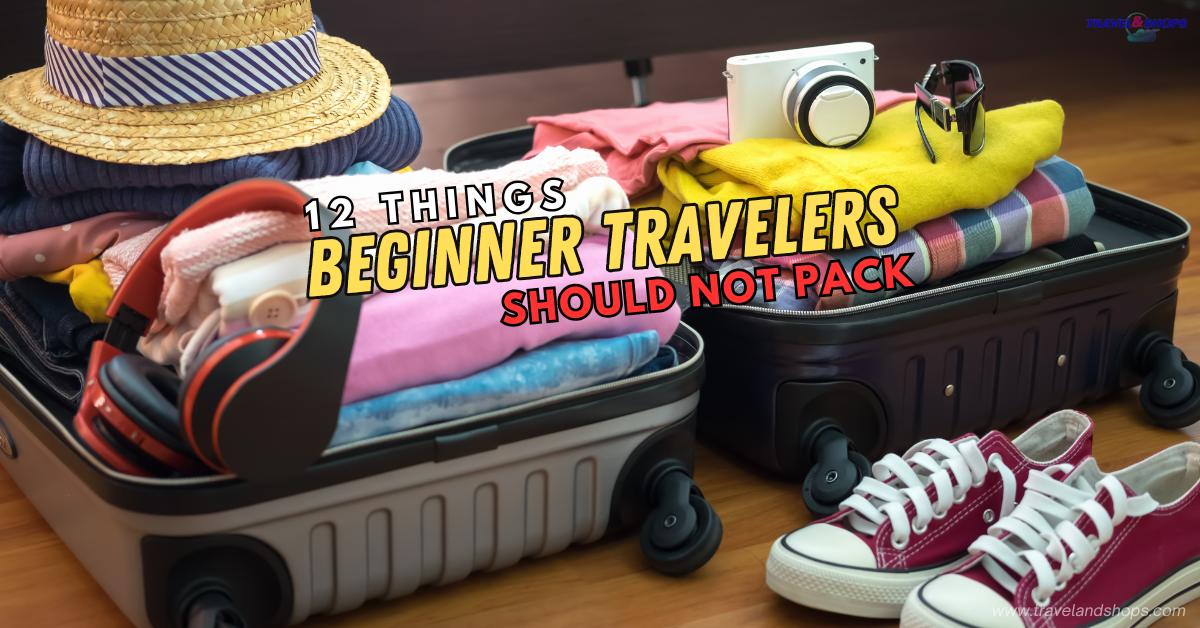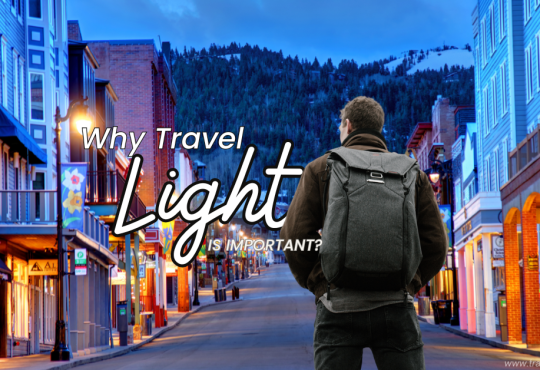
Traveling can be one of the most exciting experiences of your life. Whether you’re planning a weekend getaway or a long overseas adventure, the thrill of exploring new places is irresistible. However, for beginner travelers, packing can feel overwhelming. You might worry about forgetting something essential or overpacking items that will weigh you down. This is where the concept of traveling light becomes invaluable. Learning what to leave behind can not only ease your travel burden but also enhance your overall experience. So, what are the 12 things beginner travelers should not pack? Let’s dive into these items and explore the best tips for traveling light without feeling like you’ve left something crucial at home.
Understanding what not to pack is as important as knowing what to include in your travel bag. Packing light is an art that can significantly improve your travel experience. It allows you to move freely, avoids the hassle of lugging around unnecessary items, and gives you peace of mind. In this guide, we’ll help you identify the items that can take up precious space and how to streamline your packing process so you can travel with ease and confidence.
12 Things Beginner Travelers Should Not Pack
With these checklists, beginner travelers can gain a better understanding of what to avoid packing and why. This will help them pack more efficiently and enjoy their travels without the burden of unnecessary items.
1. Too Many Clothes
Why You Should Avoid This: Beginner travelers often fall into the trap of overestimating how many outfits they’ll need. Packing too many clothes not only weighs you down but can lead to a cluttered suitcase that’s hard to navigate.
Detailed Tips:
- Limit to Essentials: Aim for a capsule wardrobe. Bring clothing that can be layered and matched easily. For instance, two pairs of pants, a couple of tops, and a light jacket can provide several different outfits.
- Check the Weather: Before you pack, check the weather forecast for your destination. This will help you choose the right types of clothing and avoid unnecessary items.
2. Heavy Books or Paper Guides
Why You Should Avoid This: While reading material or travel guides can be enjoyable, physical books can take up a lot of space and weight in your luggage.
Alternatives:
- E-Readers and Apps: Consider using an e-reader like a Kindle or downloading travel apps that can guide you through your destination without the bulk. Many guidebooks are available as PDFs that you can download directly to your device.
3. Multiple Pairs of Shoes
Why You Should Avoid This: Shoes are often the heaviest and bulkiest items in your suitcase. Having too many pairs can complicate your travel and make your luggage harder to manage.
Detailed Tips:
- Choose Versatile Styles: Select one pair of comfortable walking shoes and one pair that can be dressed up for evenings out. This way, you’ll be prepared for different occasions without taking up too much space.
- Wear the Bulkiest Pair: If you have heavier shoes, wear them on the plane to save space in your bag.
4. Unnecessary Electronics
Why You Should Avoid This: Many beginner travelers feel the need to bring every electronic device they own. However, this can lead to a heavy bag filled with items you may not need.
What to Leave Behind:
- Consolidate Devices: Instead of bringing a camera, tablet, and phone, consider using just your smartphone, which can take pictures and manage your travel needs. If you’re concerned about battery life, invest in a portable charger.
5. Full-Size Toiletries
Why You Should Avoid This: Full-size toiletries can take up a lot of space and weight in your suitcase, leading to an unnecessarily heavy bag.
Detailed Tips:
- Travel-Sized Toiletries: Purchase travel-sized toiletries or decant your favorites into small containers. Many brands also offer travel-specific products that are lightweight and compact.
- Plan to Buy on Arrival: If possible, consider buying toiletries once you arrive at your destination, especially if you’re staying for an extended time.
6. Valuable Jewelry and Accessories
Why You Should Avoid This: Traveling with valuable items increases the risk of loss or theft, which can lead to significant stress during your trip.
Detailed Tips:
- Stick to Minimal Jewelry: Pack only a few inexpensive pieces that can complement multiple outfits. Consider bringing a single versatile necklace and a couple of pairs of earrings.
- Use Secure Storage: If you do bring any valuable jewelry, ensure it’s stored securely in your luggage or worn while traveling.
7. Overly Specific Items
Why You Should Avoid This: Items that cater to specific activities, such as ski gear or beach equipment, can take up a lot of space and may not even be used.
Alternatives:
- Rent Equipment: If you plan to participate in specific activities, research rental options at your destination. For example, you can often rent bikes, snorkel gear, or skiing equipment, saving you the hassle of packing these bulky items.
8. Full-Sized Hair Tools
Why You Should Avoid This: Hair tools like blow dryers, straighteners, or curling irons are often bulky and can easily be replaced by more compact options.
Detailed Tips:
- Travel-Sized Appliances: If you must bring hair tools, choose travel-sized versions that are specifically designed to be compact and lightweight.
- Embrace Your Natural Style: Consider leaving hair tools at home altogether and embracing a more natural hairstyle during your travels.
- Some of hotels offer these hair tools, so always check on their website and call them to inquire about if they are available or options to offer this for their guest.
9. Too Many Snacks
Why You Should Avoid This: Packing excessive snacks can lead to wasted space, and many items may spoil during your trip.
Detailed Tips:
- Select a Few Favorites: Choose a small selection of non-perishable snacks, like granola bars or nuts, that can keep you satisfied during travel days.
- Purchase Locally: Plan to buy snacks at local shops or markets once you reach your destination, allowing you to try local treats while avoiding excess weight.
10. First Aid Kits
Why You Should Avoid This: A full-sized first aid kit can take up unnecessary space in your bag.
Detailed Tips:
- Pack Essentials Only: Bring a small selection of first aid essentials like band-aids, antiseptic wipes, and any personal medications you might need. These small items can easily fit into your toiletries bag.
11. Excessive Cash
Why You Should Avoid This: Carrying too much cash can be risky. You may lose it, or it can be stolen, which could ruin your trip.
Detailed Tips:
- Use Cards for Transactions: Rely on credit or debit cards for most purchases, and withdraw local currency as needed from ATMs, which can often give you better exchange rates than currency exchanges.
12. Anything Non-Essential
Why You Should Avoid This: Items that you may think you need can quickly become clutter in your luggage, making it hard to find what you actually need.
Detailed Tips:
- Evaluate Each Item: Before you pack, consider the necessity of each item. If it’s not essential, leave it behind. Ask yourself, “Will I use this on my trip?” If the answer is no, it’s best to leave it at home.
12 Best Tips for Traveling Light
Traveling light is a skill that can enhance your overall travel experience, making your journey more enjoyable and less stressful. Packing efficiently not only saves you from the physical burden of heavy luggage but also allows for more spontaneity during your trip. Remember, the goal is to pack what you need without the extra weight, making your journey as enjoyable as possible. Here are some comprehensive tips to help you pack efficiently and avoid the pitfalls of overpacking.
1. Create a Packing List
Creating a detailed packing list is one of the best ways to ensure you don’t forget essential items while keeping your packing minimal.
- Plan Ahead: Start your packing list a week before your trip. This allows you to think about what you’ll need and avoid last-minute packing that often leads to overpacking.
- Categorize Items: Organize your list into categories such as clothing, toiletries, electronics, and travel documents. This will make it easier to track what you need and what you’ve packed.
- Check and Re-check: As you pack, check off items on your list. If you find you have multiple similar items (like four t-shirts), reconsider which ones you really need.
2. Choose the Right Bag
The right bag can make all the difference when it comes to traveling light.
- Opt for a Carry-On: If possible, choose a carry-on suitcase or a large backpack. These are typically designed to maximize space while minimizing weight.
- Consider Size and Weight Limits: Be aware of the airline’s size and weight restrictions for carry-on luggage to avoid extra fees and hassles.
- Look for Features: Select bags with multiple compartments, which can help keep your items organized and easily accessible. Bags with wheels can also reduce physical strain while traveling.
3. Wear Your Bulkiest Items
This simple tip can help you save a lot of space in your luggage.
- Dress Strategically: On travel days, wear your heaviest shoes and clothing, such as a bulky jacket or sweater. This not only saves space but also keeps you comfortable during flights or long car rides.
- Layer Up: If you’re traveling to a destination with varying temperatures, wear layers that you can easily adjust based on the weather.
4. Invest in Packing Cubes
Packing cubes can be a game-changer for travelers looking to maximize their luggage space and keep their belongings organized.
- Organize by Category: Use different packing cubes for clothing, toiletries, and accessories. This method allows you to quickly find what you need without rummaging through your entire bag.
- Compression Packing Cubes: Consider using compression cubes that reduce the volume of your clothes. This can create more space in your luggage and help you pack more efficiently.
5. Embrace Minimalism
Adopting a minimalist mindset can significantly help in determining what to pack.
- Quality Over Quantity: Choose high-quality clothing that can withstand wear and tear. Invest in versatile pieces that can serve multiple purposes, such as a dress that can be dressed up for dinner or down for a day of sightseeing.
- Focus on Essentials: Pack only what you know you’ll use. This includes prioritizing must-have items over “just-in-case” items that may not be necessary.
6. Leave Room for Souvenirs
If you plan to bring back souvenirs from your travels, make sure to leave some space in your luggage.
- Pack with Flexibility in Mind: When packing, consider that you might find items to purchase along the way. Leave a little room in your suitcase or backpack for these new additions.
- Use a Foldable Bag: Bring a lightweight, foldable bag that you can pack away until needed. This can be useful for carrying extra items, especially if you buy larger souvenirs.
7. Utilize Multi-Use Items
Multi-use items can significantly reduce the amount of stuff you need to bring.
- Versatile Clothing: Look for clothing that can be worn in multiple ways. For example, a sarong can serve as a beach cover-up, a blanket, or even a fashion accessory.
- Travel Towels: Instead of packing multiple towels, bring a quick-dry travel towel that takes up less space and is lightweight.
8. Plan Your Outfits
Planning outfits in advance can prevent the urge to pack extra clothing “just in case.”
- Capsule Wardrobe Concept: Create a capsule wardrobe with a limited number of versatile clothing pieces that can be mixed and matched. For example, three tops that can be paired with two pairs of pants can yield multiple outfits.
- Consider Activities: Think about what activities you’ll be doing on your trip and plan your outfits accordingly. This helps you pack only what you’ll actually wear.
9. Use Travel-Sized Containers
Toiletries can add significant weight to your bag, so using travel-sized containers can help lighten your load.
- Decant Products: Instead of bringing full-size toiletries, transfer your essentials into travel-sized containers. You can find reusable containers specifically designed for travel at many retailers.
- Buy Locally: If your destination has stores, consider purchasing toiletries once you arrive instead of packing them. This not only saves space but also allows you to try local brands.
10. Be Strategic with Electronics
Electronics can quickly become bulky and heavy, so it’s important to choose wisely.
- Limit Devices: Decide which electronic devices you truly need. Often, a smartphone can serve as a camera, e-reader, and entertainment device.
- Travel Apps: Download necessary travel apps, maps, and entertainment on your devices before you go. This minimizes the need for physical guidebooks and paper maps.
11. Prepare for Unexpected Situations
While traveling light, it’s also crucial to prepare for any unexpected situations that may arise.
- Essential Medications: Always pack a small supply of essential medications and a few basic first-aid items. These can be placed in a compact pouch within your luggage.
- Emergency Contacts and Copies of Important Documents: Keep a digital copy of your passport and important travel documents accessible on your phone or in your email. This way, you won’t need to carry physical copies that can be lost.
12. Stay Organized During Travel
Maintaining organization while on the go is vital for stress-free travel.
- Pack Smart: When you arrive at your destination, unpack your bag and organize your items. This will make it easier to find what you need without digging through everything.
- Use Local Resources: Familiarize yourself with your surroundings to know where to find essentials like grocery stores or pharmacies. This reduces the need to pack extra “just in case” items.
Conclusion
Traveling should be an enjoyable experience, not a stressful one filled with worries about what you may have forgotten or packed unnecessarily. By understanding the 12 things beginner travelers should not pack, you can streamline your luggage and embrace the freedom of traveling light. Remember that the goal is to pack smart, allowing for spontaneity and adventure without the weight of excess baggage.
In summary, packing wisely allows you to focus on making memories rather than stressing about your luggage. Take the time to evaluate your packing choices, and don’t hesitate to leave behind items that won’t serve you well on your journey. With these tips in hand, beginner travelers no longer pack with fear but rather with confidence, ready to explore the world ahead of them.





